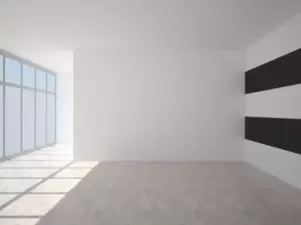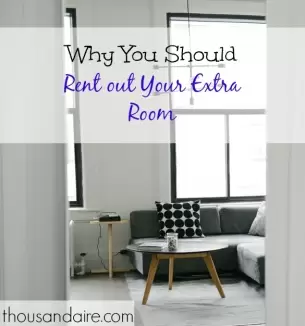
Let’s suppose that you own more house than you actually use. Basically this means that you have more bedrooms than people sleep in. (Guest rooms are an absurd waste. Buy everyone who ever visits a 5-star hotel room for the night, you’ll probably come out ahead. Don’t believe me? Do the math.) Rooms generally rent for more than you’d expect, (as much as $800 near where I live) therefore you can get a substantial portion of your mortgage paid for if you’re just willing to take on a boarder. In principle you have to pay taxes on the rent, in practice you shouldn’t be paying any substantial amount of additional tax.
The tax situation
Need to fix your furnace? That’s a deduction. Need to run your furnace? That’s a deduction too. Water? Deduction. Trash? Deduction. New carpets? Yup. Depreciation on your house? Huge deduction. Basically every expense related to your house? It’s a deduction now. There are a few caveats to keep in mind here. You only get to deduct a prorated portion of the expense depending on your roommates usage. Some things, like depreciation, you probably deduct based on the square footage they are renting. Other things, like water, you can probably prorate based on the number of people in the house. Thing number two to keep in mind is that if you do replace that furnace, you don’t get to deduct the whole thing all at once. The cost has to be spread out over its lifetime. Still, you officially have every reason to stop putting off home repairs and upgrades. This means that a dollar earned working for money for home upgrades and expenses is worth less than a dollar earned renting a bedroom for the same upgrades and expenses. So that $600/month bedroom you’re going to rent out might be like getting an $800/month raise from work.
The living situation

Well, the downside about renting out a room is that now you have to live with the person that you rented the room to. (Duh). Fortunately, since you are an owner occupier, you get a lot more say in who you rent your room out to. This means you can be a great deal more particular, since the government realizes that you’re actually going to have to live with this person. In most jurisdictions, if you feel like you aren’t comfortable renting out your extra room to a man (fairly common), that’s up to you. If you don’t want to rent your room to some smarty pants scientist, that’s up to you too. If you’re only willing to rent your room to a female rugby player over 6’4″ that only walks on her hands when indoors, you get to stick that in your ad. This is substantially different than when you are renting out an investment property. (Disclaimer: check your local laws before writing anything crazy into your ad seeking a roommate). When you’re renting a property you aren’t living in the government applies a great deal more scrutiny to whom you are saying no to. Also, I shouldn’t have to say this, but if you use the fact that you’re an owner occupier to not live with someone from a marginalized group because you don’t like minorities, you’re an asshole. Just because you can do something doesn’t mean you aren’t literally the worst person on you’re block when you do it. You’ll want to interview applicants very carefully, and spend the money on background checks. Spend the money on background checks. Run a credit report. Also, spend the money on background checks (got it?). It’s always worth understanding what you’re getting yourself into.
So there it is. Rent out your extra room. The money goes further than you think due to delicious deductions. Also, the situation isn’t as bad as it sounds because you can say no to anyone you want until you find the perfect roommate. Yes, you’ll have to share space with another human being. Get over it. Some things are more trouble than they’re worth. Extra rooms for “storage” or “guests” are one of them.
Adam Woods is a physicist. His research interests include building software to run and build geomagnetic models. Adam got interested in personal finance in the great recession when it became obvious an interest was necessary.
After harassing his friends and family (and a short intervention) he took to the web where he blogs about finance, investment, politics, and economics.
Adam is currently located in Boulder, Colorado where he can generally be found hiking, biking, or running a D&D campaign. He can also be contacted at adamwoods137@gmail.com.


Great article, I have been toying with the idea of renting out my basement that never gets used. The deductions aren’t easy though, I’ve tried aiming for deductions myself but it always seems the standard deduction turns out to be more. If you are single this would be easier, but for being married the standard deduction is over 18k. Last year I donated a washer and drier, fridge, clothes and even a really old car… All that got me to $4,200 in deductions, but the standard was just over 17k at the time so there was no point to itemize =(…
Well, I have good news. The deductions I’m talking about here stack with your standard deduction. If you do not itemize and take the 18K standard deduction you still get to add the extra room’s share of the mortgage interest, property taxes, and other expenses!
Are you putting the property under an entity? Maybe I’m wrong but I thought you had to itemize to deduct property taxes?
Well the general rule with these sorts of things is to talk with a real accountant making any life decisions. I’m not a real accountant, or a real finance person really. I’m a scientist, so keep that in mind.
However, your rental expenses go on schedule E (See: https://www.irs.gov/publications/p527/ch04.html#en_US_2014_publink1000219159). Even if you do not itemize you still get the expenses on schedule E. The relevant portion is reproduced here:
“You can deduct the expenses related to the part of the property used for rental purposes, such as home mortgage interest, qualified mortgage insurance premiums, and real estate taxes, as rental expenses on Schedule E (Form 1040). You can also deduct as rental expenses a portion of other expenses that normally are nondeductible personal expenses, such as expenses for electricity or painting the outside of the house.
There is no change in the types of expenses deductible for the personal-use part of your property. Generally, these expenses may be deducted only if you itemize your deductions on Schedule A (Form 1040).”
Go nuts.
Hey I learned something new buddy, thanks =)… I’ve looked into rental properties but never into renting out part of your own property, this is pretty cool. Have you by chance tried it? I’m just curious on what kind of deduction someone gets from it, it could probably get up to a pretty good chunk of change.